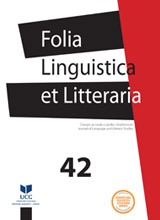Teaching Italian for Specific Purposes at the University of Montenegro: Reality vs. Real Needs
Teaching Italian for Specific Purposes at the University of Montenegro: Reality vs. Real Needs
Author(s): Deja Piletić, Gordana Luburić, Gordana MušuraSubject(s): Social Sciences, Language studies, Language and Literature Studies, Education, Foreign languages learning, Higher Education
Published by: Filološki fakultet, Nikšić
Keywords: Italian language for specific purposes; Italian as a second foreign language; University of Montenegro
Summary/Abstract: Italian as a second foreign language at the University of Montenegro is studied within the programme of Undergraduate university studies both at the Faculty of Philology and at the Faculty of Tourism and Hospitality Management. This paper aims to determine the extent to which the teaching of Italian corresponds to the real needs of the students related to the labour market, which they enter after completing their Bachelor’s degree. For this purpose, the paper presents the results of the analysis of the current syllabi of Italian as a second foreign language, which are linked to the results of the analysis of the attitudes and expectations of the students who take these courses. This analysis is based on the results of a survey conducted in the academic year 2020/2021, which had a total of 56 respondents. Based on the conclusions derived from the results of these two analyses, we will offer a set of guidelines for improving various aspects of the aforementioned university courses, so as to provide the knowledge and skills necessary for the effective use of Italian in the environment in which students are professionally engaged, while also taking into account the envisaged level of linguistic competence that is realistically achievable in the current teaching context.
Journal: Folia Linguistica et Litteraria
- Issue Year: 2022
- Issue No: 42
- Page Range: 59-71
- Page Count: 13
- Language: English

